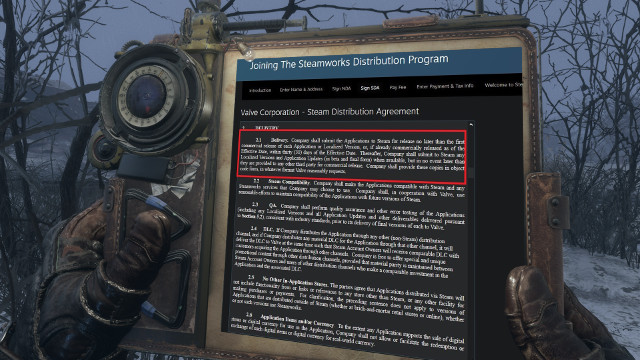Some Steam TOS changes appear to be taking aim at competing digital distribution services like the Epic Games Store. An update to Valve’s Steam Distribution Agreement contains language that seems like it would force developers to launch their games within 30 days of it arriving on other gaming platforms.
As most PC gamers know by now, the Epic Games Store has been signing exclusives to its digital distribution platform. Unfortunately, some of these games already had Steam Store pages, creating the expectation for some that it would be launching on that service in the near future. Now, some reportedly recent Steam TOS changes may very well halt this practice entirely.
ALSO: Microtransactions won’t ever go away as long as sports games exist
One important note needs to be highlighted: it’s difficult to say just how recent this change may be. Several people have said that this is a recent change, but other Twitter replies are claiming that this was implemented months ago or even before the launch of the Epic Games Store. As this is from a private page behind a sign-up form, it’s nigh impossible to establish a timeline that can be independently verified.
The Steam TOS changes, however new or old they may be, were highlighted in this tweet from the developer of the upcoming indie game Skatebird:
This is called (release) parity, and the other stores demanding this actually pay devs / give devs something for agreeing to it.
Steam just demands it now, I guess? That's, uh, a thing. pic.twitter.com/oi9zGnXKq5
— Megan Fox (@glassbottommeg) September 8, 2019
Here is the paragraph in question, transcribed from the image in the above tweet:
2.1 Delivery. Company shall submit the Applications to Steam for release no later than the first commercial release of each Application or Localized Version, or, if already commercially released as of the Effective Date, within thirty (30) days of the Effective Date. Thereafter, Company shall submit to Steam any Localized versions and Application Updates (in beta and final form) when available, but in no event later than they are provided to any other third party for commercial release. Company shall provide these copies in object code form, in whatever format Valve reasonably requests.
An analysis of the legalese on Reddit’s /r/Games breaks things down pretty nicely, though they don’t mention whether they are or are not a lawyer. Essentially, this section of the Steam Distribution Agreement enforces the following:
- If you put up a Steam Store page, you can’t release the game earlier on another platform.
- Any patches/updates must be released for Steam at the same time as they are on other platforms.
- Games can be released on other platforms, but you can’t put up a Steam store page until 30 days before the Steam release or the game’s original release, depending on which of the two is earlier.
While this doesn’t explicitly mention the Epic Games Store, a casual reading of this section of the agreement shows that it would put a stop to games jumping ship to the Epic Games Store after having had a Steam Store page for weeks or months on end.
This appears to be Valve’s first legal counterattack against the Epic Game Store’s proclivity to poach upcoming releases. Only time will tell how this will all play out.







